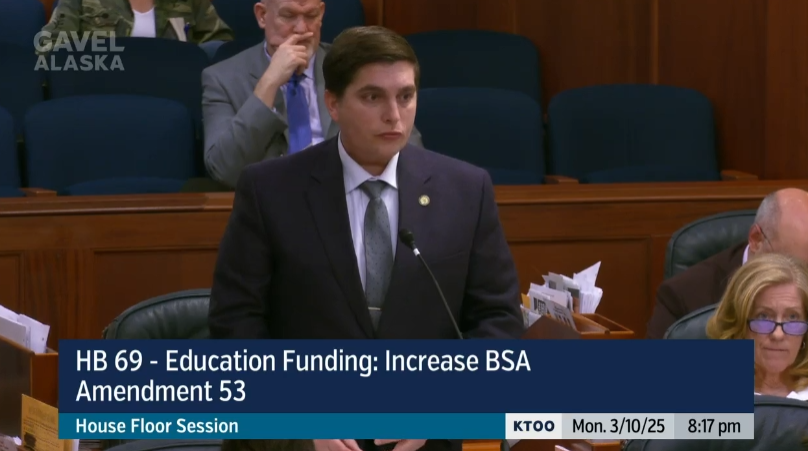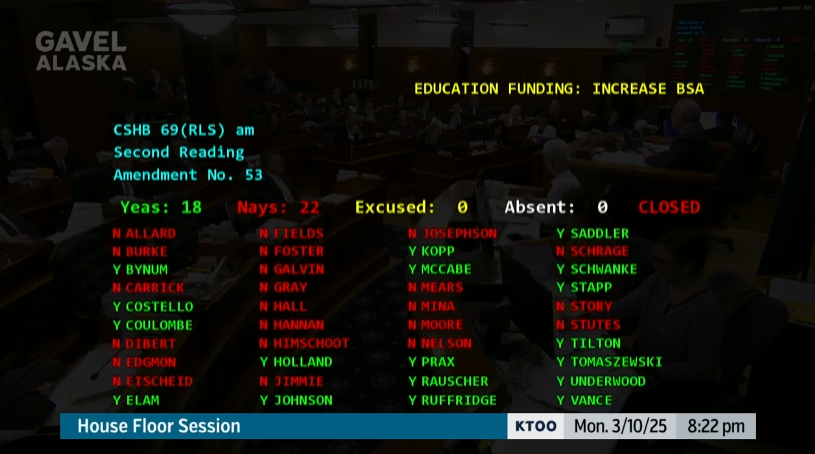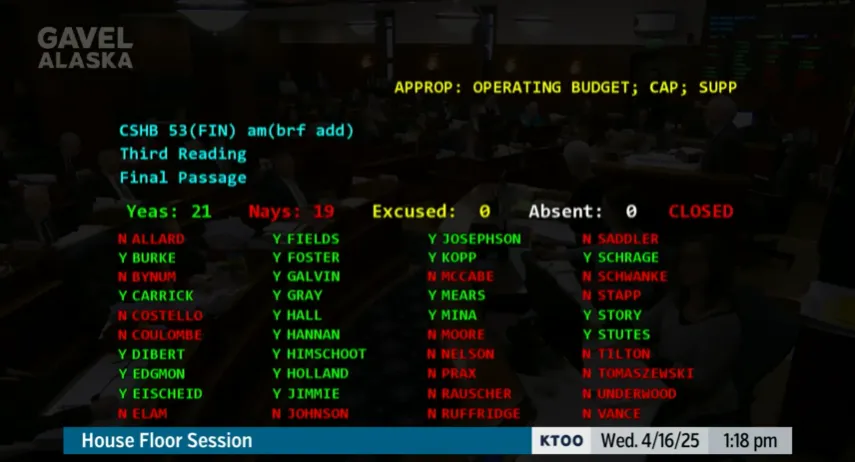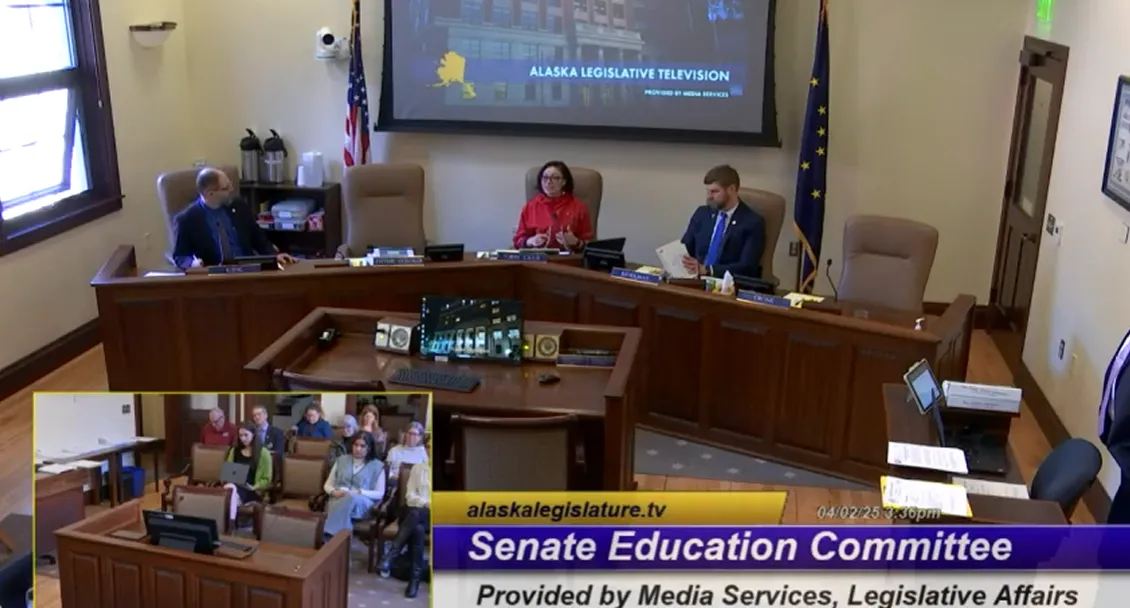House GOP pushes expanded use of force in the classroom, because of course
Because of course.
It's Tuesday, Alaska.
In this edition: The education funding bill is finally on the House floor, where Dunelavy Republicans spent much of Monday bombarding the legislation with just about whatever kooky self-important idea they could dream up on education. It was a display that serves as a good reminder on the importance of discipline in the amendment process because the whole day was capped off with an hour-long debate on the use of force (some may call it corporal punishment, but that's gonna get an objection from the Dunleavy Republicans) to control a "defiant, willful child."
Current mood: 😠
House GOP pushes expanded use of force in the classroom, because of course

As the House worked through the hundred-some amendments that Dunleavy-aligned Republicans submitted to a bill ostensibly about school funding, I was reminded of the approach that minority Democrats took in the era of Speaker Mike Chenault. On the budget, the caucus would put together a handful of amendments representing core values like early childhood education, numbering somewhere in the teens. Who carried what was also a strategic choice with legislators working to make a point about where they stood and why the Republican-crafted budget was deficient. It created a united front where the messaging and focus was clear.
The 19-member House Republican Minority has done none of that. Instead of a tightly focused case for conservative policies on education, what we were subjected to was a far-ranging, meandering set of amendments that seemed to reflect whatever fever dream that Republicans have been telling themselves about where education policy must go. The BSA increase is unaffordable, they argued, while insisting that legislators first come up with a plan to pay for it, but in the same breath, demanded that more than $75 million be set aside just for homeschool students with no explanation of why it's needed beyond vibes or where the money would be coming from. The intra-district open enrollment is terrible; they whined while also harping against the sunset date and pushing other amendments to expand open enrollment across the state. After crying that funding shouldn't be handed out without accountability and policy changes, they moved to erase every accountability and policy change contained in the bill.
It's hard to say what, if any, their actual plan for education policy is. At best, it seemed like their idea of compromise is much the same as Gov. Mike Dunleavy's idea of compromise: Give me everything I want and I won't do worse.
And in perhaps one of the more ludicrous moments of this legislative session came when the Dunleavy Republicans rallied around Amendment 53 by Rep. Justin Ruffridge, R-Soldotna, that would expand the use of "reasonable and appropriate nondeadly force" to control and restrain a misbehaving child.
In a school funding bill.
The proposed amendment would essentially allow teachers or any "other person responsible for students" to mete out discipline as outlined in school-by-school rules. While Ruffridge bristled mightily at the suggestion that his legislation would enable teachers to use corporal punishment on students, it's also not entirely clear that the legislation doesn't allow that. It simply talks about allowing teachers and others to discipline children — including with "reasonable force" — and maintain classroom safety. Oh, and it also would help cover their legal fees.

"By no means should we be hitting children," Ruffridge said, admonishing others for reading the plain text of his amendment and drawing that conclusion. "It's not saying that we are wanting teachers to go in and start manhandling children."
But his comments seem to be contradicted in part by his fellow Republicans, like Big Lake Republican Rep. Kevin McCabe, who seemed to fondly talk about a wooden paddle with speed holes used on misbehaving children.
"Look how I turned out!" he exclaimed.

Rep. Dan Saddler, R-Eagle River, said that teachers may not say it but they are probably pleading and celebrating the measure, adding that there's "nothing worse to the good order and decorum and progress of a school than a defiant, willful child."
Yes, those darn defiant, willful children (see also: former Rep. Tom "My Children Belong to Me" McKay).
Rep. Sarah Vance, the Homer Republican who verbally slapped around public school students when they wrote into her asking for additional funding, said that expanding the use of force in the classroom is an important tool to keep teachers around. She called it "a brave conversation."
Members of the bipartisan Majority Coalition registered their disgust with the measure in a handful of fiery speeches. Reps. Nellie Jimmie and Robyn Burke outlined the horrible historical trauma of corporal punishment perpetrated against Alaska Native students in state boarding schools. Jimmie said some kids never came back. Burke recalled her grandmother's experience.
Rep. Robyn Burke explains why force in the classroom carries a dark history in Alaska. (Gavel Alaska screengrab)
"Nearly every single Alaska Native student in my district is descended from somebody who was forced to attend a residential school. My grandmother was picked up, placed in a trash can and hit by a ruler on her hands for speaking her language," Burke said. "There are other options. ... Expanding corporal punishment doesn't address the needs appropriately, it opens wounds for rural schools."
As seems to be the uncomfortable case with Republicans, they largely dismissed the concerns of rural members, insisting what they were proposing could be separated from the state's dark history.
Other legislators also seemed aghast at the real-world impacts of some very vague language. Anchorage Democratic Rep. Andrew Gray noted that "other person responsible for students" could be as simple as a parent chaperone on a school trip. Would they be cleared under this amendment to discipline kids with "reasonable and appropriate nondeadly force"?
"Other parents don't have a right to hit my child," Gray said. "PERMISSION NOT GRANTED."
Rep. Genevieve Mina, D-Anchorage, noted that one of the schools in her district has a high number of kids with behavioral issues but that she's never once heard from a teacher there that additional force is needed. Instead, she said they need the kind of help that comes with expanded funding, such as smaller class sizes.
While Dunleavy Republicans dutifully lined up in support of the amendment, offering mealy-mouthed and self-important arguments about why expanding the use of allowable force in the classroom is needed, the only one to split was none other than right-wing Eagle River Rep. Jamie Allard (though, oddly, she did co-sponsor the amendment).
Rep. Jamie Allard explains her opposition to an amendment that would expand the use of allowable force in the classroom. (Gavel Alaska screengrab)
"If a teacher ever touched my child, we're going to have words and maybe more," she said. "This is not appropriate for anybody. These are government employees, they do not touch my child. I grew up in the 70s, they whipped us. I got paddled, I went to a private Christian school, I know what it feels like. If I saw one of those teachers, I might run them over with a bus. I don't want this happening to my kid."
Allard said the amendment may just be expanding existing law, but she's going to have to look at that existing law after hearing the debate.
Ultimately, Allard was the only Dunleavy Republican to break from the pack. The amendment failed 18-22.

Stay tuned. The House will be back today with more amendments.
Follow the threads: Part one of the amendments, part two of the amendments, and the corporal punishment amendment.
The Alaska Memo Newsletter
Join the newsletter to receive the latest updates in your inbox.




